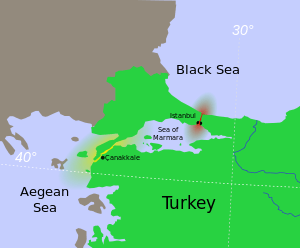Dardanus
In Greek mythology, Dardanus (/ˈdɑːrdənəs/; Greek: Δάρδανος[1]) was a son of Zeus and Electra, daughter of Atlas, and founder of the city of Dardanus at the foot of Mount Ida in the Troad.
Dionysius of Halicarnassus (1.61–62) states that Dardanus' original home was in Arcadia, where Dardanus and his elder brother Iasus (elsewhere more commonly called Iasion) reigned as kings following Atlas. Dardanus married Chryse, daughter of Pallas,[2] by whom he fathered two sons: Idaeus and Deimas. When a great flood occurred, the survivors, who were living on mountains that had now become islands, split into two groups: one group remained and took Deimas as king while the other sailed away, eventually settling in the island of Samothrace. There Iasus (Iasion) was slain by Zeus for lying with Demeter. Dardanus and his people found the land poor and so most of them set sail for Asia.
A different account in Virgil's Aeneid (3.163f) has Aeneas in a dream learn from his ancestral Penates that "Dardanus and Father Iasius" and the Penates themselves originally came from Hesperia, afterwards renamed as Italy. This tradition holds that Dardanus was a Tyrrhenian prince, and that his mother Electra was married to Corythus, king of Tarquinia (Aeneid 7.195-242; 8. 596 ss.; 9. 10; Servio, ad Vergilium, Aeneidos, 9.10).
The historical accuracy of Virgil's claim should be debated, however, as according to many noted Greek and Roman historians, it was the escaping Trojans who gave rise to the Etruscans, and later the Romans.
Other accounts make no mention of Arcadia or Hesperia, though they sometimes mention a flood and speak of Dardanus sailing on a hide-raft (as part of the flood story?) from Samothrace to the Troad near Abydos. All accounts agree that Dardanus came to the Troad from Samothrace and was there welcomed by King Teucer and that Dardanus married Batea the daughter of Teucer. (Dionysius mentions that Dardanus' first wife Chryse had died.) Dardanus received land on Mount Ida from his father-in-law. There Dardanus founded the city of Dardanus which became the capital of his kingdom. He later founded the city of Thymbra in honor of his friend Thymbraeus, who is said to have been killed by Dardanus. Dardanus waged war successfully against his neighbors, especially distinguishing himself against the Paphlagonians and thereby extending the boundaries of his kingdom with considerable acquisitions.

Dardanus' children by Batea were Ilus, Erichthonius, Idaea and Zacynthus. Ilus died before his father which Idaea married Phineus, an early Thracian king. According to Dionysius of Halicarnassus (1.50.3), Zacynthus was the first settler on the island afterwards called Zacynthus. Dardanus' sons by Chryse, his first wife, were Idaeus and Dimas. Dionysius says (1.61.4) that Dimas and Idaeus founded colonies in Asia Minor. Idaeus gave his name to the Idaean mountains, that is Mount Ida, where he built a temple to the Mother of the Gods (that is to Cybele) and instituted mysteries and ceremonies still observed in Phrygia in Dionysius's time. There are operas on the subject of Dardanus by Jean-Philippe Rameau (1739), Carl Stamitz (1770) and Antonio Sacchini (1784).
Dardanus reigned for sixty four or sixty five years and was succeeded by his son Erichthonius.
Family tree
References
- ↑ The name is traditionally associated with δαρδάπτω (dardapto) "to wear, to slay, to burn up"
- ↑ Graves, Robert. The Greek Myths, ISBN 0-14-017199-1, p.358